How a 1970s make-do-and-mend attitude resonates now
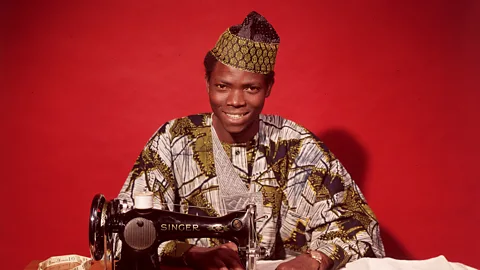 Getty Images
Getty ImagesNigeria's inspiring "slow fashion" culture, from the traditional "obioma", or mobile tailor, to creative, small-batch design.
"Ding, ding, ding," the sound of shears hitting a sewing machine would go, followed closely by a voice calling "obioma, oh". This is how Nigerian mobile tailors, or obiomas, as they became fondly and popularly called, would signal to customers that they were in their neighborhoods ready to do alterations. Obiomas became a mainstay of Nigerian life in the 1970s. In order to earn a livelihood, these mobile tailors would hoist a sewing machine on their pillowed shoulders, and roam around residential areas offering to fix a zip here, or hem some trousers there. Their work set the tone for the relationship Nigerians now have with alterations and tailoring.
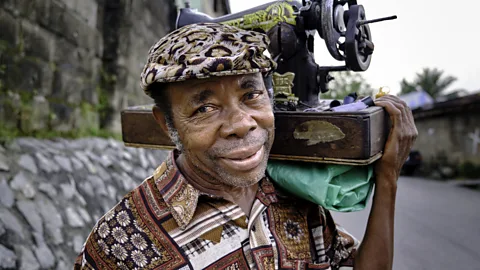 Getty Images
Getty ImagesMuch has been written about how important tailoring is to fashion's lifecycle. In fact, Hollywood star and philanthropist Angelina Jolie's recently-opened Atelier in New York considers tailoring so crucial that customers who purchase pieces are offered a service to have the fit customised on the spot by the atelier's in-house tailors. Yet for the average clothing consumer, tailoring is unknown territory. So unknown that Nigerian-American stylist and writer, Subrina Heyink – after years of working with clients of different backgrounds and encouraging tailoring relationships – concluded that her own relative ease with tailoring had to be due to her upbringing in Nigeria.
In Heyink's style newsletter, Are You Wearing That?, she often references tailoring clothes as a key way to develop a wardrobe that is right for the individual, and that fits well. The writer has, over the past three years, helped to teach subscribers how to develop their own personal style, and have a better relationship with clothes and consumption.
"When we were really young in Nigeria, my grandma would buy us fabric," Heyink tells the BBC. "We'd take it to the different tiers of tailors we had – one for more complex clothing needs, and a neighborhood one for fixing. And so, when I moved here [California] and didn't have tailors readily available, I could see what a difference having clothes specifically made or altered to fit you could bring." This love for tailoring is one she hopes to pass on to all she interacts with, whether it's styling clients or newsletter subscribers.
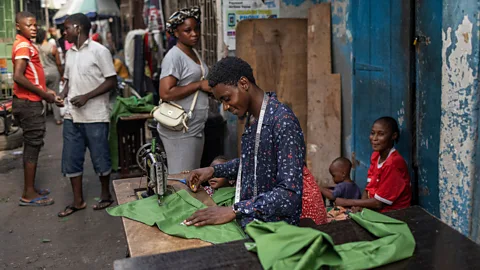 Getty Images
Getty ImagesLike Heyink, many Nigerians grow up having a relationship with a tailor. Mothers would hold their young ones' hands as they took their clothing to tailors who had previously been vetted to transform old items, or requested new styles from new fabric. As the children grew and life changed, they'd then maintain the tailoring relationships fostered by their mothers, or develop their own relationships via a search within their new adult neighborhoods or via word-of-mouth recommendation. One thing was guaranteed, at least one person in a family knew of a tailor.
Abubakar, an obioma who started out in Sokoto, northern Nigeria and now works in Lagos, explains that a lot of his customers are regulars who found him on the street, gave him a few pieces with minor alterations to test him, were impressed, and now call whenever they have pieces to fix.
Having a tailor who you have known and used for years has its advantages. "That's someone who knows your taste, your measurements and maybe even your lifestyle and can help reduce how many clothes are tossed away due to damage by inexperienced tailors or tailor-client communication breakdowns," says Olusola Idowu, of the Nigerian arm of the Fashion Revolution climate activism group. This tailor-client communication breakdown is the subject of jokes and memes on social media about "what I ordered v what I got", with the majority of the jokes referring to disappointing products received from fast-fashion brands.
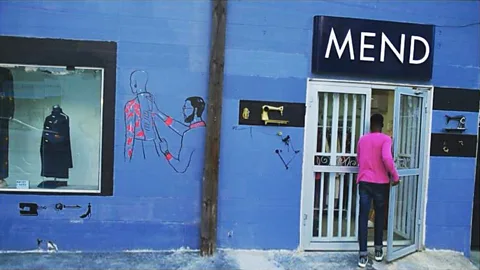 Kanyinsola Doherty
Kanyinsola Doherty"Nigerians think any apparel can be repaired – we've seen everything brought in for our tailors, from bras to waist trainers to duvets," Kanyinsola Doherty of Mend Lagos tells the BBC. Doherty founded Mend Lagos to address the need for specialised alterations beyond obiomas. For the traditional obioma, times have changed for various reasons, and many are being phased out. Security is one reason – increased crime in certain areas has resulted in more neighborhood security patrol. This limits the comings and goings of non-residents, so mobile tailors are no longer able to roam as freely as they previously did. And the economic downturn has also had an effect – due to inflation, many have found the business not sustainable, and have opted out.
More like this:
While fixing some items can be painstaking, it is work that head tailor of Mend Lagos, Joseph Ndache, says he is proud of, as it creates fun challenges for his team of tailors. This also points to a culture of extending the lifecycle of things that might seem to be finished done once damaged.
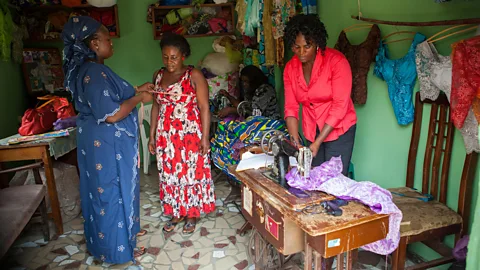 Alamy
AlamyHowever, as admirable as it might be, not every tailor is open to mending all items. Memunat Momodu, who runs her own tailoring shop, says that she prefers to create new garments rather than mend old ones, as this is more time- and cost-effective for her. And some young Nigerians have re-learnt basic sewing skills that were once taught in Home Economics classes at school. Joy Cletus says economic conditions forced her to pick up skills like hemming and taking clothes in, and she ultimately bought her own sewing machine, feeling that it was worth the investment.
Tailors like Momudu who opt out of clothing alterations altogether are not scarce of clients. Romanda Ihunenye of the Fashion for Charity organisation shares that in an informal survey carried out in Owerri, Eastern Nigeria, 50% of the young women asked said they preferred to sew completely new clothes rather than repair. Ihunenye’s organisation helps extend the lifecycle of leftover materials, particularly local cotton, which is given directly to communities dealing with clothing poverty.
Beyond opting to sew new clothes, other factors have shifted the alteration mindset in Nigeria in recent times. As Idowu puts it: "So much is made now that is just unfixable especially as more young Nigerians gain access to fast fashion either directly through the retailers or via thrifted clothes from the West that are dumped in Africa." This creates a problem where tailors are unable to salvage the pieces because they have been cut into styles that make it impossible to re-work the fabric, and so the clothes are ultimately dumped.
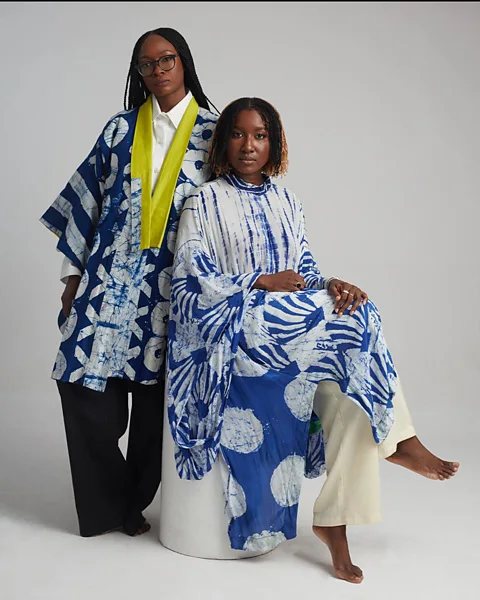 Dye Lab
Dye LabDoherty says her tailors also have another challenge – where they end up shortening the lifecycle of clothes because customers want a fit that's less about comfort and room for expansion, and more about "showing a figure" that is inspired by western ideals. But even as these factors increase rather than curb fashion waste, some young Nigerians, including the Dye Lab brand, are pushing back against western influences. They are defining Nigerian fashion trends by reinterpreting traditional boubous and kaftans, intentionally designed to be loose fitting and made from traditional, sustainable fabrics. As a "craft brand" who create "small batches" of hand-dyed garments, their approach echoes the Nigerian sartorial sensibility – artisanal fashion that is both personal and practical. As Idowu puts it about his fellow Nigerians: "We make the garments our own. We develop emotional attachments to them."
--
If you liked this story, sign up for The Essential List newsletter – a handpicked selection of features, videos and can't-miss news delivered to your inbox every Friday.
